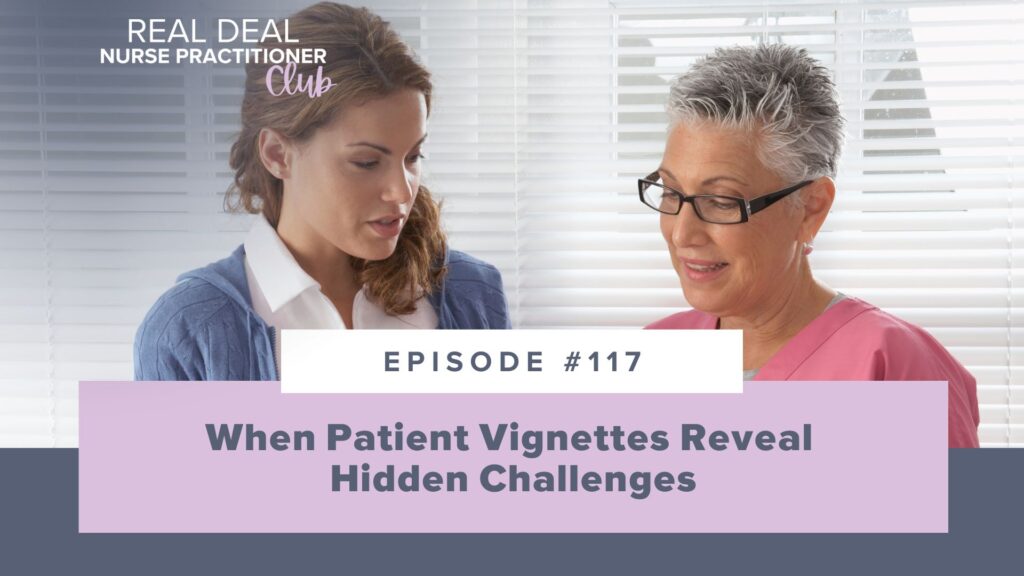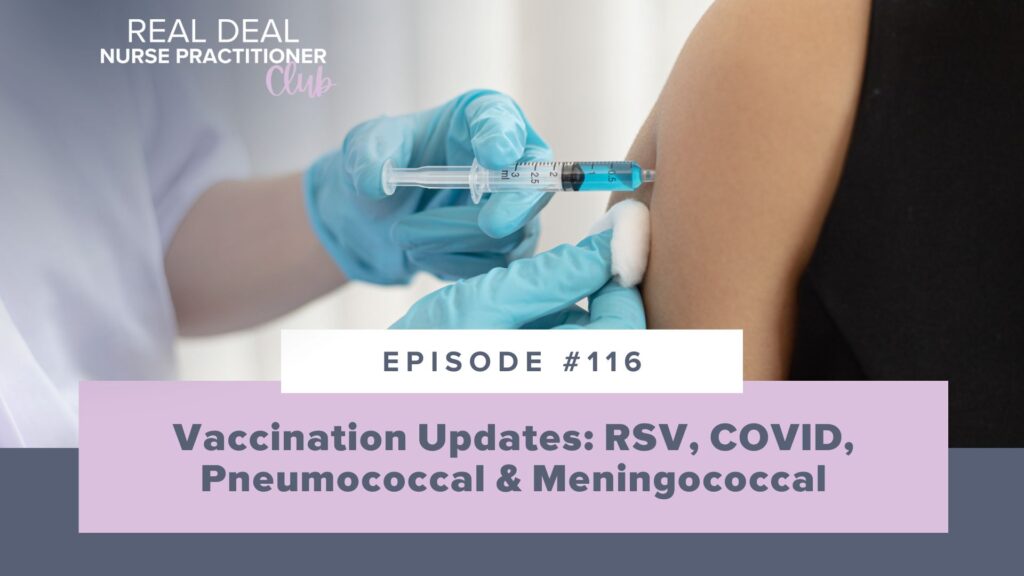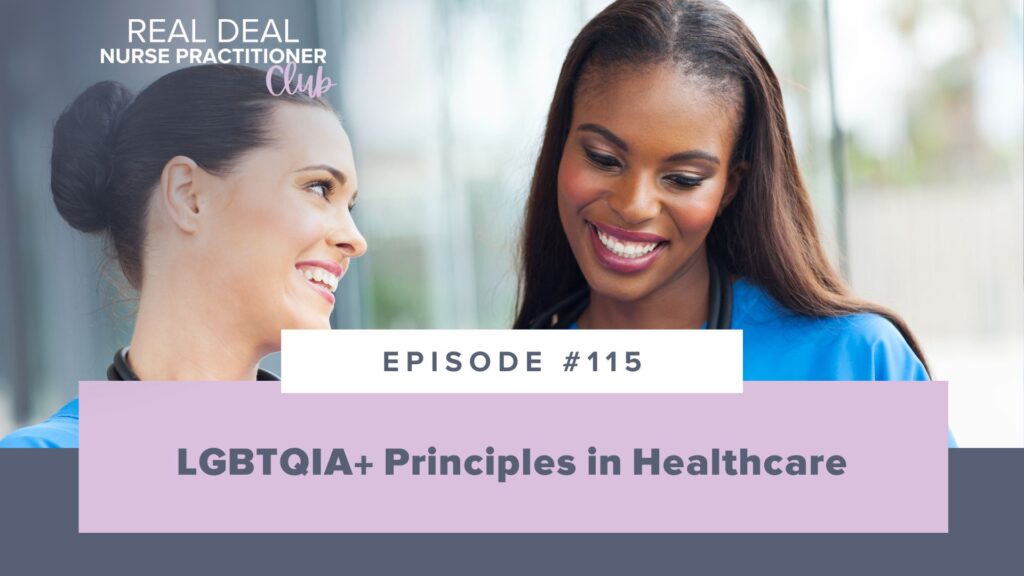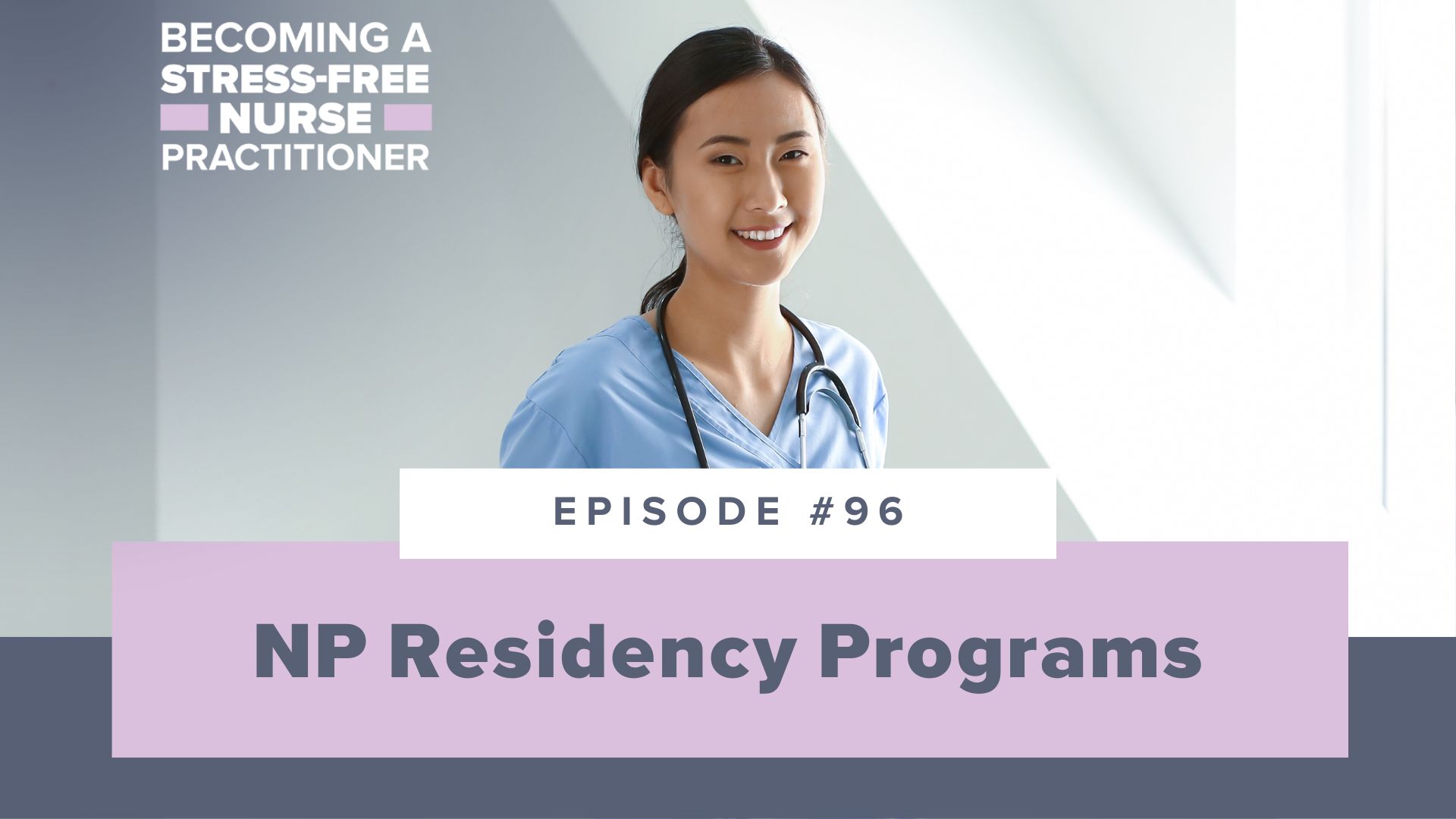
Anna and I are here this week to talk about a wonderful opportunity available for additional clinical experience, not only for Nurse Practitioner students but also for brand-new real-deal NPs too, and that is Nurse Practitioner residency programs.
The role of Nurse Practitioners have grown, both in complexity and in significance within the healthcare system. As a result, there has been a growing need for more formalized training programs that bridge the gap between your education at school and preparing for actual practice. This is where NP residency programs can be a great first step in your career.
Join us on this episode as Anna and I explore what Nurse Practitioner residency programs are, what they include, how to find them, our top tips for applying for them, and what to expect after you complete a residency.
If you’re looking for support, no matter what phase of your nurse practitioner journey you’re currently in, I have communities available for both students and new nurse practitioners. In these communities, we work to uplift one another and grow this profession together every day, so click here to check them out!
What You Will Discover:
- What a Nurse Practitioner residency program is.
- The primary goal of Nurse Practitioner residency programs.
- Why Nurse Practitioner residency programs are valuable for NP students and new NPs.
- Our top tips for applying to a Nurse Practitioner residency program.
- How to find Nurse Practitioner residency programs.
- What you can expect after you complete a residency program.
Featured on the Show:
- If you’re looking for extra support, I have communities available for both students and new nurse practitioners. Click here if you’re a student, and click here if you’re a new NP!
- Follow me on: Facebook | Instagram | YouTube | TikTok
- National Organization of Nurse Practitioner Faculties (NONPF)
- American Nurses Credentialing Center (ANCC)
- American Association of Nurse Practitioners
Full Episode Transcript:

Welcome to Becoming a Stress-Free Nurse Practitioner, a show for new NPs and students that want to pass their board exam the first time and make that transition from RN to NP as seamless as possible. I’m your host Sarah Michelle. Now, let’s dive into today’s episode.
Sarah: Hey there, friends. Today Anna and I are talking about a wonderful, wonderful opportunity for not only nurse practitioner students, but new nurse practitioners as well. And that is nurse practitioner residency programs.
And so in this episode we’re going to explore what NP residency programs are, what they include, how to find them, that’s always a big thing, and then what comes next after you complete a residency.
And so to just kick things off, let’s talk about what a nurse practitioner residency program is. And you may have some experience from your nursing journey, there are nurse residency programs now, but essentially, these programs play a crucial role in bridging that gap between your education and school, but then your actual practice too.
So imagine them as the final phase of your training after graduation. So these programs are typically for new graduate nurse practitioners, and are designed to build on your knowledge, your skills, your confidence, all those important things. And what these programs allow new nurse practitioners to do is just gain more clinical experience and educate, like we’re going to talk about.
But first, how did NP residency programs even come to be, Anna?
Anna: Yeah, well, we even talked about this a little bit when we were talking in a past episode about continuing education requirements. But back in the day, when nurse practitioners first started coming about, they didn’t have the same opportunities for that structured postgraduate training that physicians had through residencies.
But, as we know, the role of nurse practitioners has grown both in complexity and really within the significance of the healthcare system. And so there’s been a growing need for more formalized training programs. And so that goes for NP residencies, right? The more nurse practitioners grew, the more the training grew, that is really where these NP residency programs began to emerge, to respond to this need.
Like Sarah said, I mean, they’re really designed to provide new NPs with additional clinical experience, it is so, so valuable. And you also get that mentorship and education beyond what you would have received just during the academic program or your school.
Sarah: Yeah, and the way that I like to think about these residency programs is really the primary goal here is to increase your confidence and your competence as a new nurse practitioner, because we know that transition to practice can be so difficult.
And so these programs just really offer a safe and supportive environment for new nurse practitioners, especially to refine those clinical skills, enhance your diagnostic abilities, and figure out how to develop those strong patient management strategies because that is definitely a skill and something you’re going to learn over time.
And additionally too, NP residency programs often focus on specific clinical specialties. So you’ll have a residency program that’s geared towards family practice, or a residency program that’s geared towards pediatrics, et cetera. And so a primary care residency by me actually had new FNPs do rotations in their primary care clinic, pediatric clinic, and women’s health clinics. So they really got a good range of experiences and could decide where would be the best fit for them.
Anna: Yeah, that is so awesome that you could choose between those three and really get a good experience. Because sometimes those clinical hours you get during school, it’s not quite enough. And so let’s really dig into what these include. Because these programs, they really are a step up from those clinical rotations you’ve already completed.
So first and foremost, we’ve mentioned these programs involve direct patient care and decision making. So during these rotations, you work alongside experienced healthcare providers in that real world clinic setting.
So you are taking a patient load, you’re applying your knowledge, you get to refine all of these clinical skills and really get that exposure to a huge variety of patient cases. And it’s a little bit more independence than you had as a student because you’ve graduated, you’ve passed your boards, you’re licensed.
But a really, really big benefit is that supervision and mentorship are key components of NP residency. So new NPs get to receive extra guidance and feedback from experienced preceptors to really help them navigate all of the challenges that come with being a brand new nurse practitioner. I cannot tell you how invaluable this mentorship is for building that confidence and competence, like Sarah mentioned.
Sarah: And kind of just how these are set up, like how long it’s going to be and the schedule of the residency program can totally vary depending upon which one you’re doing. So I’ve seen programs last for six months, some might even extend up to a full year.
A lot of the ones I’ve seen personally are around that 12 month mark, like that’s a good fit time wise. And what the schedule typically includes is just a mix of clinical rotations, the didactic sessions, so that’s just a fancy way of saying lectures, and then ongoing education too.
So the didactic or that more classroom-like component of nurse practitioner residencies is going to cover just various topics relevant to whatever the specialty is. So latest research, guidelines, evidence-based practice. We’re working in medicine, things change all the time, guidelines update all the time.
And the goal of these is to build on that knowledge base you already got in school because that’s important, but make it more specific to the patient population that you’re seeing regularly. And it’s really just complimenting that hands-on experience overall.
Anna: Yeah, so if you’re listening to this and you’re a nurse practitioner student or a new NP, you might be wondering, how do you even find these residency programs? Well fear not, we’ve got you covered here.
So if you can find one of these near you, I highly, highly recommend applying. Now, I will warn you, sometimes they do have a little bit of a decreased pay over that first year. But they will set you up to have such a successful and confident start to your new career.
So really what I recommend for the first step in searching for one of these residency programs is just to tap into any online resources or directories near you. Literally, a simple online search can help you find a whole database of residencies. So you want to look into different organizations near you, or even areas you’d be willing to move to.
So pay attention as you’re looking into these programs to where they are, what specialties they are and definitely pay attention to the application deadlines.
Sarah: And I think alongside that same note, too, we just never stress enough how important that networking with your peers and your mentors is. So this is another valuable strategy for finding those NP residency programs, reach out to your professors, clinical preceptors, fellow students, they may have insights into residency programs in your desired specialty or wherever you’re looking to move to potentially.
And, in fact, I didn’t know until my first day of clinicals, but my very first preceptor was actually the head of one of the NP residency programs near me at the time. So you just never know where that door is going to open for you.
Anna: Yeah, and as you go to apply to these, the application process is going to vary, but it typically involves submitting your resume, submitting your transcripts, getting letters of recommendation, and you usually have to complete some type of personal statement. And I always recommend that you just tailor your application to highlight your passion for whatever the specialty is, and how much you want to advance your skills and be involved.
I also always, always recommend looking into the organization you are applying to, like look into what their core values are. Look into their mission and their vision and whatever they have available on their website. Look into what their patient population is. Because if you can reference those, and if you can showcase how you would be an excellent asset to those in that personal statement, that can really set you apart.
Sarah: And I think just thinking overall too, requirements, of course, for NP residency programs can vary, but often they include a lot of the same thing. So I’m thinking things like, obviously, completion of your nurse practitioner program, you’re going to have to get that certification and be a real deal NP first.
But note here you often need to apply before. So don’t wait until you graduate to start the search for an NP residency program if you know that’s going to be the right fit for you. You just need to have graduated and passed your board exam before you actually begin that residency.
Of course, you’re going to need a nursing license and an APRN license. And, again, you can often apply for this before you are certified, and certified means you’ve taken the exam. And then what’s going to happen is the certifying body is going to report to your state board of nursing once you pass that exam to make your license active.
Definitely strong letters of recommendation are kind of across the board from either clinical preceptors or past professors, along those lines. And then that compelling personal statement Anna was just talking about explaining why you want to be a part of this particular residency program.
You don’t want to submit the same personal statement to every single residency program you’re applying to. Really tailor it to why you want to be a part of this specific one, and how it’s going to align with your career goals and how you’re going to move forward.
Anna: Yeah, exactly. And now let’s say you’ve applied, you have gotten into a residency program. You have done it, you have successfully completed it, huge congratulations. What comes next? And this is really when you transition from residency to that true practice.
And after completing a residency, I am telling you a world of job opportunities awaits. You will be able to find positions in various healthcare settings depending on your specialty. So some might go to hospitals, some might go to clinics or primary care practices or even specialty practices just depending on your degree and your passions.
But one of the biggest perks of this, I think, is that so many graduates of NP residency programs actually end up securing full-time positions within whatever organization or institution they completed their residency in.
Sarah: I also want to mention too, specialization is another avenue that you can explore after your residency is done. So depending on your interests and the skills you develop during your program, you may decide that you want to focus on a specific area of practice, like I don’t know, cardiology, dermatology, or oncology.
And that specialization can open doors to different advanced practice opportunities, and potentially a higher earning potential too, which I know is always in the back of everybody’s mind. So there are also additional certifications you can obtain depending upon whatever your desired specialty is. And definitely look into those because it’s just another way to set yourself apart.
But really, continuing learning and professional development are essential for nurse practitioners throughout their careers. And after doing a residency program, just really commit yourself to staying current with that latest research, the latest guidelines, the best practices in your specialties, because you can never, never, never learn enough and expand your knowledge and skill set enough.
Anna: Yeah, as nurses, as nurse practitioners, as really just healthcare providers, we are lifelong learners. And I think that really covers the main points about NP residency programs. So as we wrap up, let’s just do a quick recap.
Remember that these NP residency programs, they’re such a good bridge between that education that you get in school and preparing for practice. So you get such comprehensive training and you get mentorship every step of the way.
Now, finding these programs, applying to these programs, completing these programs, it takes a lot of effort. But it is so worth it for all of the experience that they provide. So if you are a nurse practitioner student or you’re a new NP and you’re not sure where to go, consider exploring these programs as a valuable, valuable first step in your career.
I am telling you all, they can truly make a difference in your journey to becoming a very skilled and confident healthcare provider.
Sarah: Yeah, and I’ll add in just one last thing here too, as we close out this episode. Retention rates for first year nurse practitioners, so what I mean by that is you complete your first year and you actually stay in the nurse practitioner profession, you don’t go back to being a nurse or find another job, are pretty low historically.
And so these NP residency programs are a great way to ideally increase those retention rates and keep people in the profession because why did you go to school for three to five years to then not use the degree and have all these capabilities that you’ve been dreaming of? But just a little nugget before we close this out, and we will talk to you again next week. Check out all the nurse practitioner residency programs in your area.
As an extra bonus, friends, if you’re looking for support no matter what phase of your nurse practitioner journey you’re currently in, I have communities available for both students and new nurse practitioners. In these communities, we work to uplift one another and grow this profession together every single day. Links to join will be included for you in the show notes.
Thanks for listening to Becoming a Stress-Free Nurse Practitioner. If you want more information about the different types of support we offer to students and new NPs, visit https://www.npreviews.com/resources. See you next week.
Enjoy the Show?
- Don’t miss an episode: follow the podcast on Spotify, Apple Podcasts, Google Podcasts, or RSS.
- Leave a review in Apple Podcasts.
Search the Blog
Join our Facebook Group!
Get FREE support and encouragement from thousands of FNP/AGPCNP students and our NP Support team.
Learn More3 Study Hacks to Conquer Your NP Exam!
Download these tips that have helped thousands of students pass their NP board exams.
Download NowInstitutional Partnerships
Are you a faculty member and would like to bring Sarah Michelle’s resources to your school? Email us at nursinggroups@blueprintprep.com for special institutional pricing or click on the link below to learn more.
Learn MoreGroup Discounts
Are you a student and have 10 or more classmates interested in purchasing Sarah Michelle’s courses? Email us at nursinggroups@blueprintprep.com for special pricing.
